University of East London TM6101: Food Safety Policy and Culture in UK
VerifiedAdded on 2022/12/27
|6
|2037
|60
Essay
AI Summary
This essay examines the challenges within the UK's Food Safety Act, particularly focusing on the impact of fluctuating customer preferences and habits, such as the increasing consumption of junk food. It identifies key issues related to food policy within the UK, critically analyzes the interplay between food and society, and evaluates the external environmental factors influencing food consumption. The report also delves into the socio-cultural influences, including social class, cultural background, and social context, that shape food choices. Furthermore, it identifies consequences of these influences and proposes strategies, such as government initiatives and menu labeling, to improve existing UK policies. The essay highlights the need for continuous monitoring and adaptation of food policies to align with changing consumer behaviors, ultimately aiming to promote healthier eating habits and address the rising obesity rates in the UK.
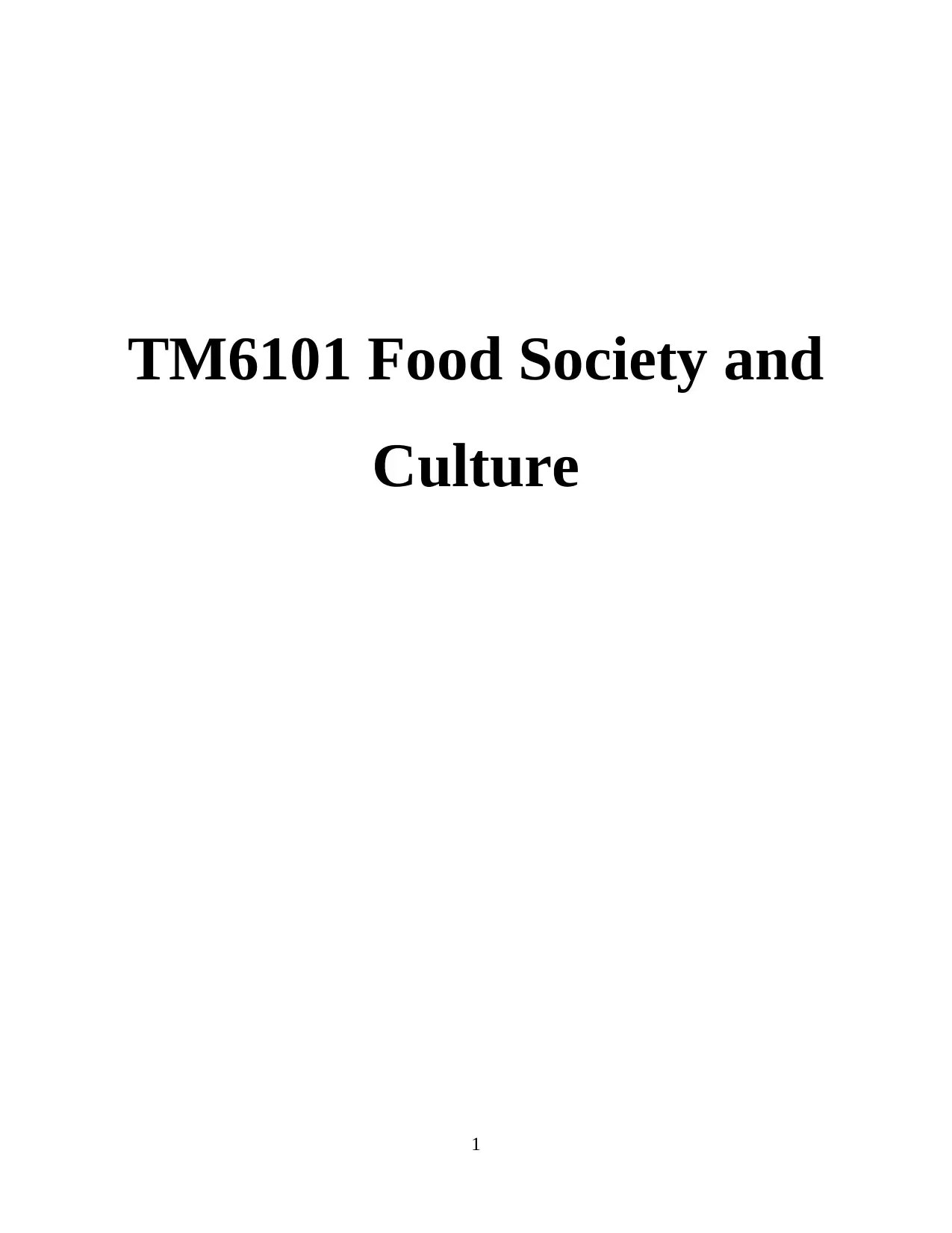
TM6101 Food Society and
Culture
1
Culture
1
Paraphrase This Document
Need a fresh take? Get an instant paraphrase of this document with our AI Paraphraser
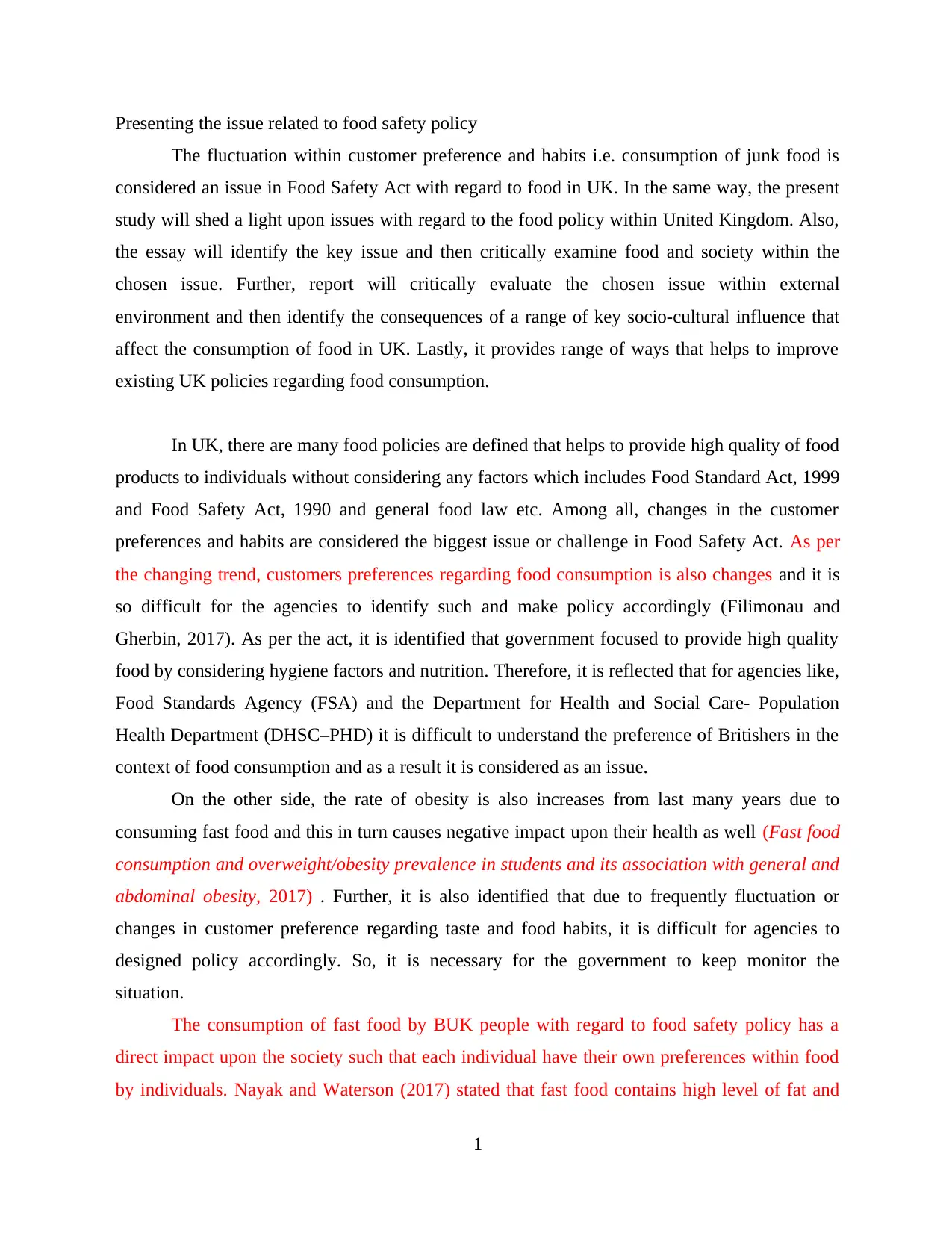
Presenting the issue related to food safety policy
The fluctuation within customer preference and habits i.e. consumption of junk food is
considered an issue in Food Safety Act with regard to food in UK. In the same way, the present
study will shed a light upon issues with regard to the food policy within United Kingdom. Also,
the essay will identify the key issue and then critically examine food and society within the
chosen issue. Further, report will critically evaluate the chosen issue within external
environment and then identify the consequences of a range of key socio-cultural influence that
affect the consumption of food in UK. Lastly, it provides range of ways that helps to improve
existing UK policies regarding food consumption.
In UK, there are many food policies are defined that helps to provide high quality of food
products to individuals without considering any factors which includes Food Standard Act, 1999
and Food Safety Act, 1990 and general food law etc. Among all, changes in the customer
preferences and habits are considered the biggest issue or challenge in Food Safety Act. As per
the changing trend, customers preferences regarding food consumption is also changes and it is
so difficult for the agencies to identify such and make policy accordingly (Filimonau and
Gherbin, 2017). As per the act, it is identified that government focused to provide high quality
food by considering hygiene factors and nutrition. Therefore, it is reflected that for agencies like,
Food Standards Agency (FSA) and the Department for Health and Social Care- Population
Health Department (DHSC–PHD) it is difficult to understand the preference of Britishers in the
context of food consumption and as a result it is considered as an issue.
On the other side, the rate of obesity is also increases from last many years due to
consuming fast food and this in turn causes negative impact upon their health as well (Fast food
consumption and overweight/obesity prevalence in students and its association with general and
abdominal obesity, 2017) . Further, it is also identified that due to frequently fluctuation or
changes in customer preference regarding taste and food habits, it is difficult for agencies to
designed policy accordingly. So, it is necessary for the government to keep monitor the
situation.
The consumption of fast food by BUK people with regard to food safety policy has a
direct impact upon the society such that each individual have their own preferences within food
by individuals. Nayak and Waterson (2017) stated that fast food contains high level of fat and
1
The fluctuation within customer preference and habits i.e. consumption of junk food is
considered an issue in Food Safety Act with regard to food in UK. In the same way, the present
study will shed a light upon issues with regard to the food policy within United Kingdom. Also,
the essay will identify the key issue and then critically examine food and society within the
chosen issue. Further, report will critically evaluate the chosen issue within external
environment and then identify the consequences of a range of key socio-cultural influence that
affect the consumption of food in UK. Lastly, it provides range of ways that helps to improve
existing UK policies regarding food consumption.
In UK, there are many food policies are defined that helps to provide high quality of food
products to individuals without considering any factors which includes Food Standard Act, 1999
and Food Safety Act, 1990 and general food law etc. Among all, changes in the customer
preferences and habits are considered the biggest issue or challenge in Food Safety Act. As per
the changing trend, customers preferences regarding food consumption is also changes and it is
so difficult for the agencies to identify such and make policy accordingly (Filimonau and
Gherbin, 2017). As per the act, it is identified that government focused to provide high quality
food by considering hygiene factors and nutrition. Therefore, it is reflected that for agencies like,
Food Standards Agency (FSA) and the Department for Health and Social Care- Population
Health Department (DHSC–PHD) it is difficult to understand the preference of Britishers in the
context of food consumption and as a result it is considered as an issue.
On the other side, the rate of obesity is also increases from last many years due to
consuming fast food and this in turn causes negative impact upon their health as well (Fast food
consumption and overweight/obesity prevalence in students and its association with general and
abdominal obesity, 2017) . Further, it is also identified that due to frequently fluctuation or
changes in customer preference regarding taste and food habits, it is difficult for agencies to
designed policy accordingly. So, it is necessary for the government to keep monitor the
situation.
The consumption of fast food by BUK people with regard to food safety policy has a
direct impact upon the society such that each individual have their own preferences within food
by individuals. Nayak and Waterson (2017) stated that fast food contains high level of fat and
1
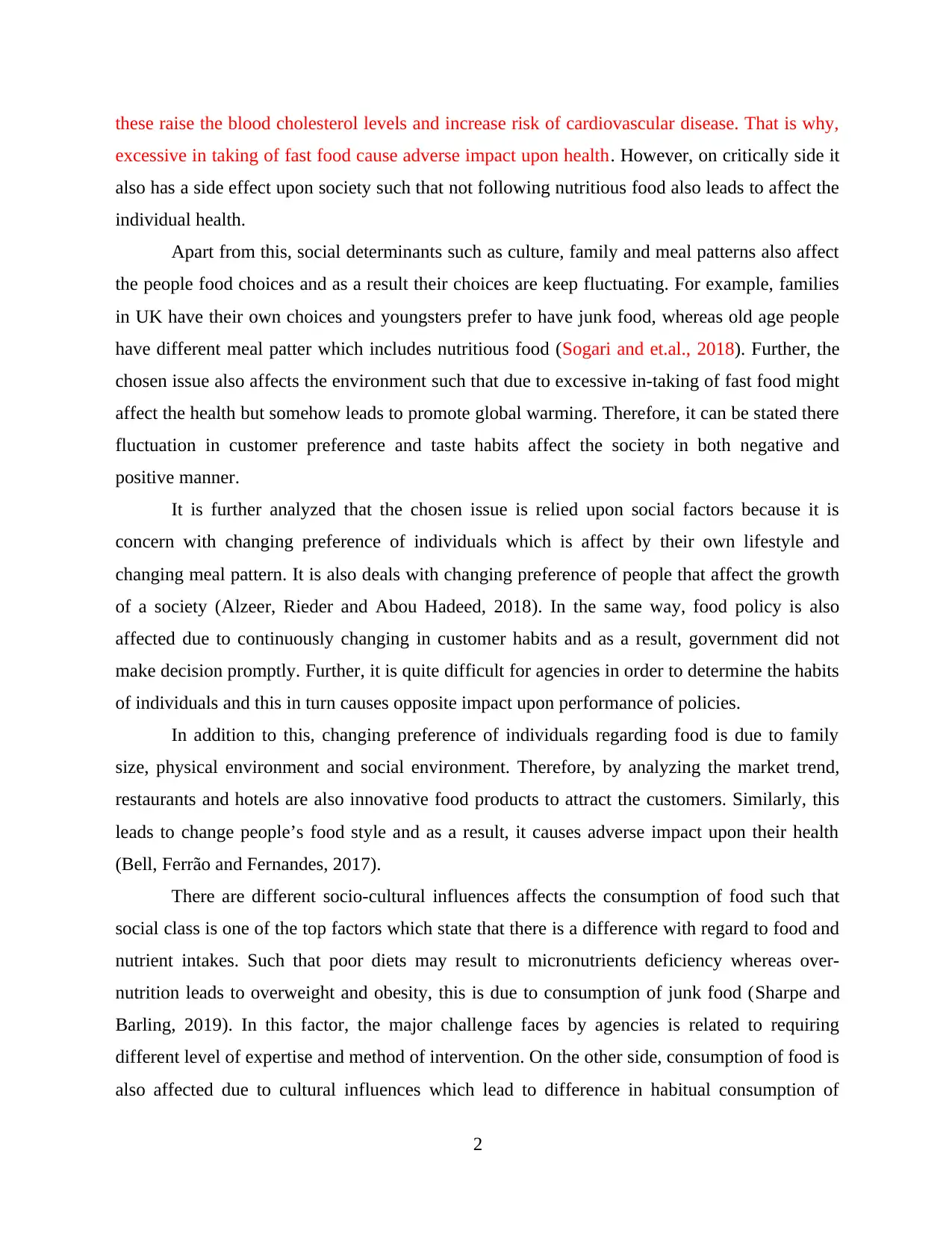
these raise the blood cholesterol levels and increase risk of cardiovascular disease. That is why,
excessive in taking of fast food cause adverse impact upon health. However, on critically side it
also has a side effect upon society such that not following nutritious food also leads to affect the
individual health.
Apart from this, social determinants such as culture, family and meal patterns also affect
the people food choices and as a result their choices are keep fluctuating. For example, families
in UK have their own choices and youngsters prefer to have junk food, whereas old age people
have different meal patter which includes nutritious food (Sogari and et.al., 2018). Further, the
chosen issue also affects the environment such that due to excessive in-taking of fast food might
affect the health but somehow leads to promote global warming. Therefore, it can be stated there
fluctuation in customer preference and taste habits affect the society in both negative and
positive manner.
It is further analyzed that the chosen issue is relied upon social factors because it is
concern with changing preference of individuals which is affect by their own lifestyle and
changing meal pattern. It is also deals with changing preference of people that affect the growth
of a society (Alzeer, Rieder and Abou Hadeed, 2018). In the same way, food policy is also
affected due to continuously changing in customer habits and as a result, government did not
make decision promptly. Further, it is quite difficult for agencies in order to determine the habits
of individuals and this in turn causes opposite impact upon performance of policies.
In addition to this, changing preference of individuals regarding food is due to family
size, physical environment and social environment. Therefore, by analyzing the market trend,
restaurants and hotels are also innovative food products to attract the customers. Similarly, this
leads to change people’s food style and as a result, it causes adverse impact upon their health
(Bell, Ferrão and Fernandes, 2017).
There are different socio-cultural influences affects the consumption of food such that
social class is one of the top factors which state that there is a difference with regard to food and
nutrient intakes. Such that poor diets may result to micronutrients deficiency whereas over-
nutrition leads to overweight and obesity, this is due to consumption of junk food (Sharpe and
Barling, 2019). In this factor, the major challenge faces by agencies is related to requiring
different level of expertise and method of intervention. On the other side, consumption of food is
also affected due to cultural influences which lead to difference in habitual consumption of
2
excessive in taking of fast food cause adverse impact upon health. However, on critically side it
also has a side effect upon society such that not following nutritious food also leads to affect the
individual health.
Apart from this, social determinants such as culture, family and meal patterns also affect
the people food choices and as a result their choices are keep fluctuating. For example, families
in UK have their own choices and youngsters prefer to have junk food, whereas old age people
have different meal patter which includes nutritious food (Sogari and et.al., 2018). Further, the
chosen issue also affects the environment such that due to excessive in-taking of fast food might
affect the health but somehow leads to promote global warming. Therefore, it can be stated there
fluctuation in customer preference and taste habits affect the society in both negative and
positive manner.
It is further analyzed that the chosen issue is relied upon social factors because it is
concern with changing preference of individuals which is affect by their own lifestyle and
changing meal pattern. It is also deals with changing preference of people that affect the growth
of a society (Alzeer, Rieder and Abou Hadeed, 2018). In the same way, food policy is also
affected due to continuously changing in customer habits and as a result, government did not
make decision promptly. Further, it is quite difficult for agencies in order to determine the habits
of individuals and this in turn causes opposite impact upon performance of policies.
In addition to this, changing preference of individuals regarding food is due to family
size, physical environment and social environment. Therefore, by analyzing the market trend,
restaurants and hotels are also innovative food products to attract the customers. Similarly, this
leads to change people’s food style and as a result, it causes adverse impact upon their health
(Bell, Ferrão and Fernandes, 2017).
There are different socio-cultural influences affects the consumption of food such that
social class is one of the top factors which state that there is a difference with regard to food and
nutrient intakes. Such that poor diets may result to micronutrients deficiency whereas over-
nutrition leads to overweight and obesity, this is due to consumption of junk food (Sharpe and
Barling, 2019). In this factor, the major challenge faces by agencies is related to requiring
different level of expertise and method of intervention. On the other side, consumption of food is
also affected due to cultural influences which lead to difference in habitual consumption of
2
⊘ This is a preview!⊘
Do you want full access?
Subscribe today to unlock all pages.

Trusted by 1+ million students worldwide
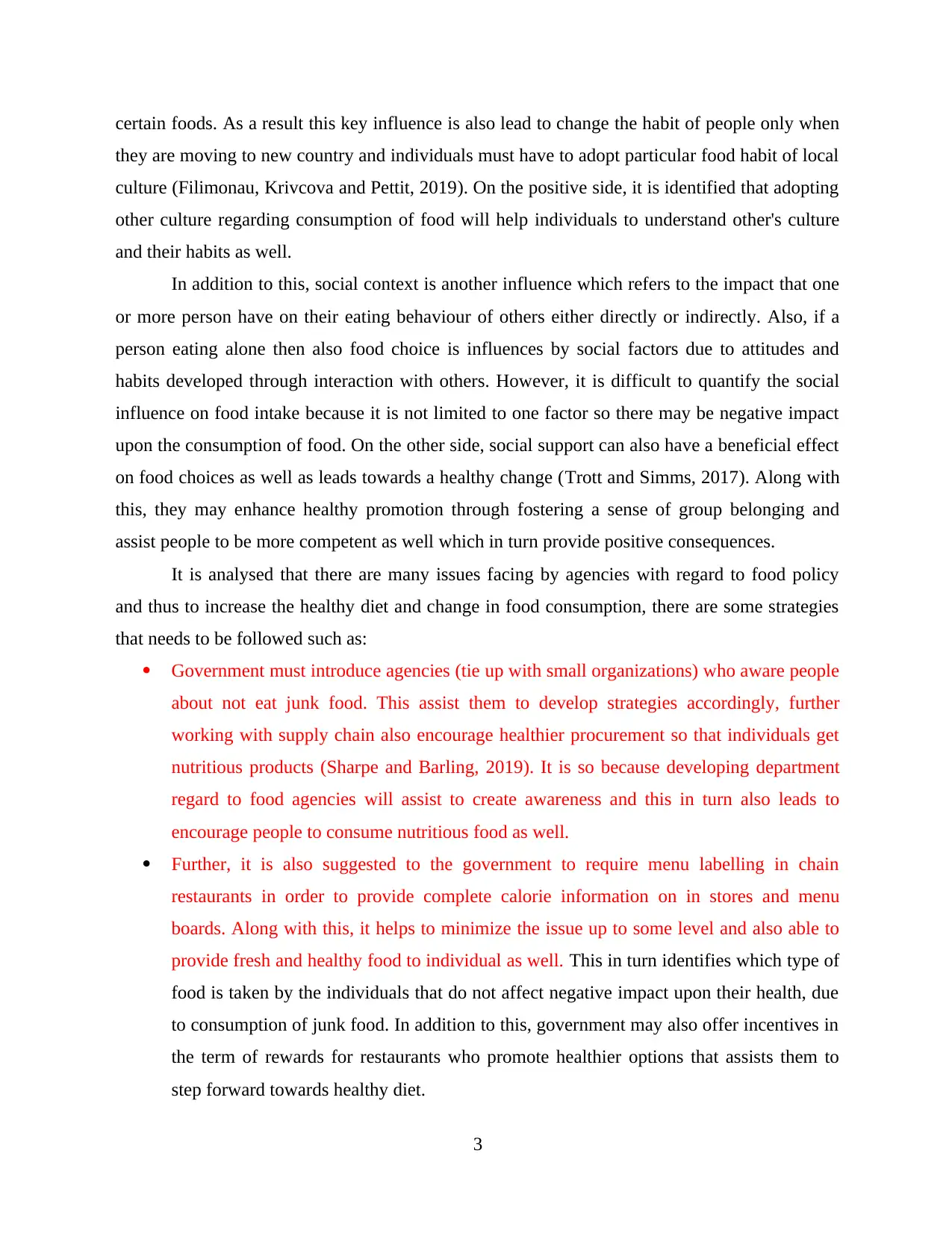
certain foods. As a result this key influence is also lead to change the habit of people only when
they are moving to new country and individuals must have to adopt particular food habit of local
culture (Filimonau, Krivcova and Pettit, 2019). On the positive side, it is identified that adopting
other culture regarding consumption of food will help individuals to understand other's culture
and their habits as well.
In addition to this, social context is another influence which refers to the impact that one
or more person have on their eating behaviour of others either directly or indirectly. Also, if a
person eating alone then also food choice is influences by social factors due to attitudes and
habits developed through interaction with others. However, it is difficult to quantify the social
influence on food intake because it is not limited to one factor so there may be negative impact
upon the consumption of food. On the other side, social support can also have a beneficial effect
on food choices as well as leads towards a healthy change (Trott and Simms, 2017). Along with
this, they may enhance healthy promotion through fostering a sense of group belonging and
assist people to be more competent as well which in turn provide positive consequences.
It is analysed that there are many issues facing by agencies with regard to food policy
and thus to increase the healthy diet and change in food consumption, there are some strategies
that needs to be followed such as:
Government must introduce agencies (tie up with small organizations) who aware people
about not eat junk food. This assist them to develop strategies accordingly, further
working with supply chain also encourage healthier procurement so that individuals get
nutritious products (Sharpe and Barling, 2019). It is so because developing department
regard to food agencies will assist to create awareness and this in turn also leads to
encourage people to consume nutritious food as well.
Further, it is also suggested to the government to require menu labelling in chain
restaurants in order to provide complete calorie information on in stores and menu
boards. Along with this, it helps to minimize the issue up to some level and also able to
provide fresh and healthy food to individual as well. This in turn identifies which type of
food is taken by the individuals that do not affect negative impact upon their health, due
to consumption of junk food. In addition to this, government may also offer incentives in
the term of rewards for restaurants who promote healthier options that assists them to
step forward towards healthy diet.
3
they are moving to new country and individuals must have to adopt particular food habit of local
culture (Filimonau, Krivcova and Pettit, 2019). On the positive side, it is identified that adopting
other culture regarding consumption of food will help individuals to understand other's culture
and their habits as well.
In addition to this, social context is another influence which refers to the impact that one
or more person have on their eating behaviour of others either directly or indirectly. Also, if a
person eating alone then also food choice is influences by social factors due to attitudes and
habits developed through interaction with others. However, it is difficult to quantify the social
influence on food intake because it is not limited to one factor so there may be negative impact
upon the consumption of food. On the other side, social support can also have a beneficial effect
on food choices as well as leads towards a healthy change (Trott and Simms, 2017). Along with
this, they may enhance healthy promotion through fostering a sense of group belonging and
assist people to be more competent as well which in turn provide positive consequences.
It is analysed that there are many issues facing by agencies with regard to food policy
and thus to increase the healthy diet and change in food consumption, there are some strategies
that needs to be followed such as:
Government must introduce agencies (tie up with small organizations) who aware people
about not eat junk food. This assist them to develop strategies accordingly, further
working with supply chain also encourage healthier procurement so that individuals get
nutritious products (Sharpe and Barling, 2019). It is so because developing department
regard to food agencies will assist to create awareness and this in turn also leads to
encourage people to consume nutritious food as well.
Further, it is also suggested to the government to require menu labelling in chain
restaurants in order to provide complete calorie information on in stores and menu
boards. Along with this, it helps to minimize the issue up to some level and also able to
provide fresh and healthy food to individual as well. This in turn identifies which type of
food is taken by the individuals that do not affect negative impact upon their health, due
to consumption of junk food. In addition to this, government may also offer incentives in
the term of rewards for restaurants who promote healthier options that assists them to
step forward towards healthy diet.
3
Paraphrase This Document
Need a fresh take? Get an instant paraphrase of this document with our AI Paraphraser
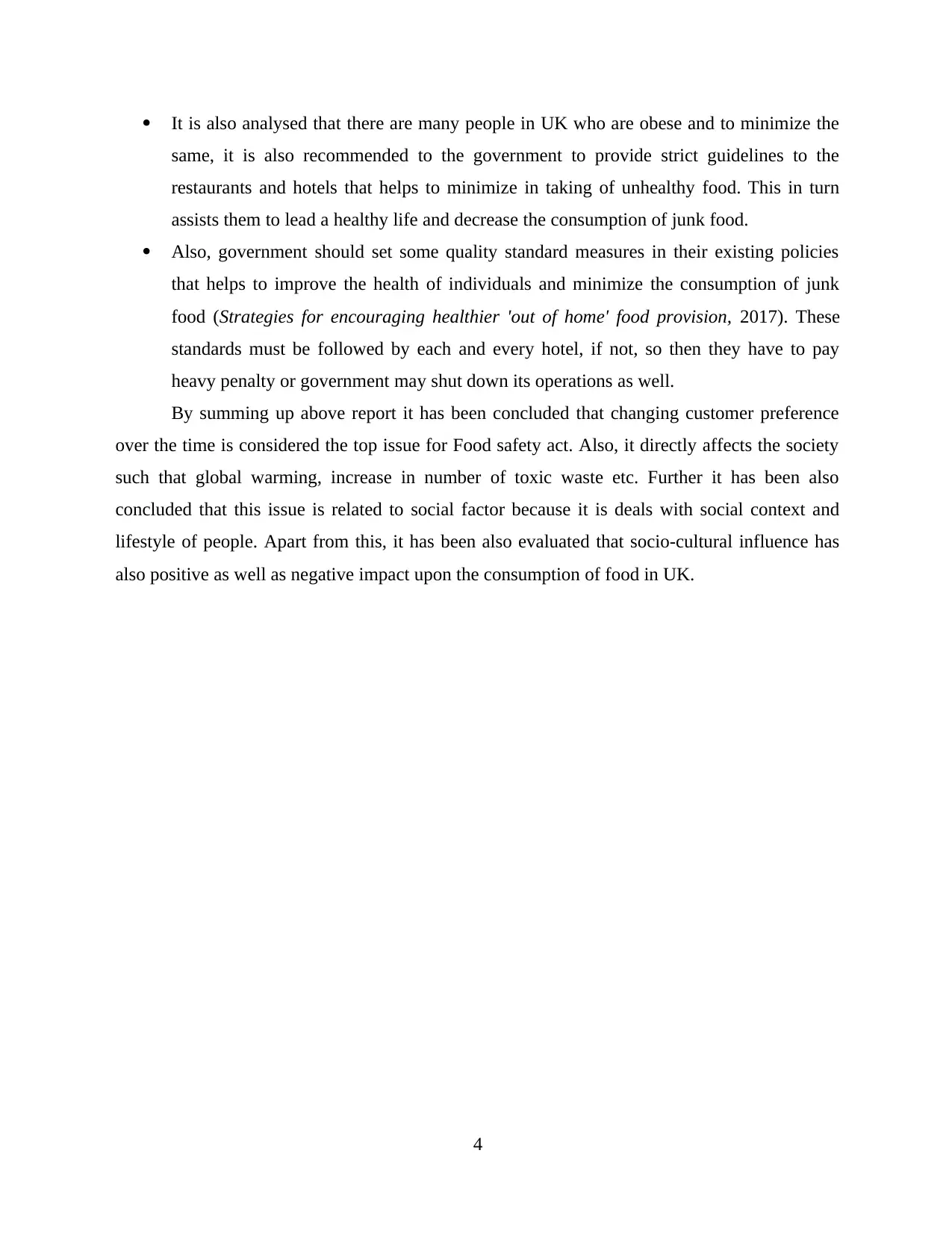
It is also analysed that there are many people in UK who are obese and to minimize the
same, it is also recommended to the government to provide strict guidelines to the
restaurants and hotels that helps to minimize in taking of unhealthy food. This in turn
assists them to lead a healthy life and decrease the consumption of junk food.
Also, government should set some quality standard measures in their existing policies
that helps to improve the health of individuals and minimize the consumption of junk
food (Strategies for encouraging healthier 'out of home' food provision, 2017). These
standards must be followed by each and every hotel, if not, so then they have to pay
heavy penalty or government may shut down its operations as well.
By summing up above report it has been concluded that changing customer preference
over the time is considered the top issue for Food safety act. Also, it directly affects the society
such that global warming, increase in number of toxic waste etc. Further it has been also
concluded that this issue is related to social factor because it is deals with social context and
lifestyle of people. Apart from this, it has been also evaluated that socio-cultural influence has
also positive as well as negative impact upon the consumption of food in UK.
4
same, it is also recommended to the government to provide strict guidelines to the
restaurants and hotels that helps to minimize in taking of unhealthy food. This in turn
assists them to lead a healthy life and decrease the consumption of junk food.
Also, government should set some quality standard measures in their existing policies
that helps to improve the health of individuals and minimize the consumption of junk
food (Strategies for encouraging healthier 'out of home' food provision, 2017). These
standards must be followed by each and every hotel, if not, so then they have to pay
heavy penalty or government may shut down its operations as well.
By summing up above report it has been concluded that changing customer preference
over the time is considered the top issue for Food safety act. Also, it directly affects the society
such that global warming, increase in number of toxic waste etc. Further it has been also
concluded that this issue is related to social factor because it is deals with social context and
lifestyle of people. Apart from this, it has been also evaluated that socio-cultural influence has
also positive as well as negative impact upon the consumption of food in UK.
4
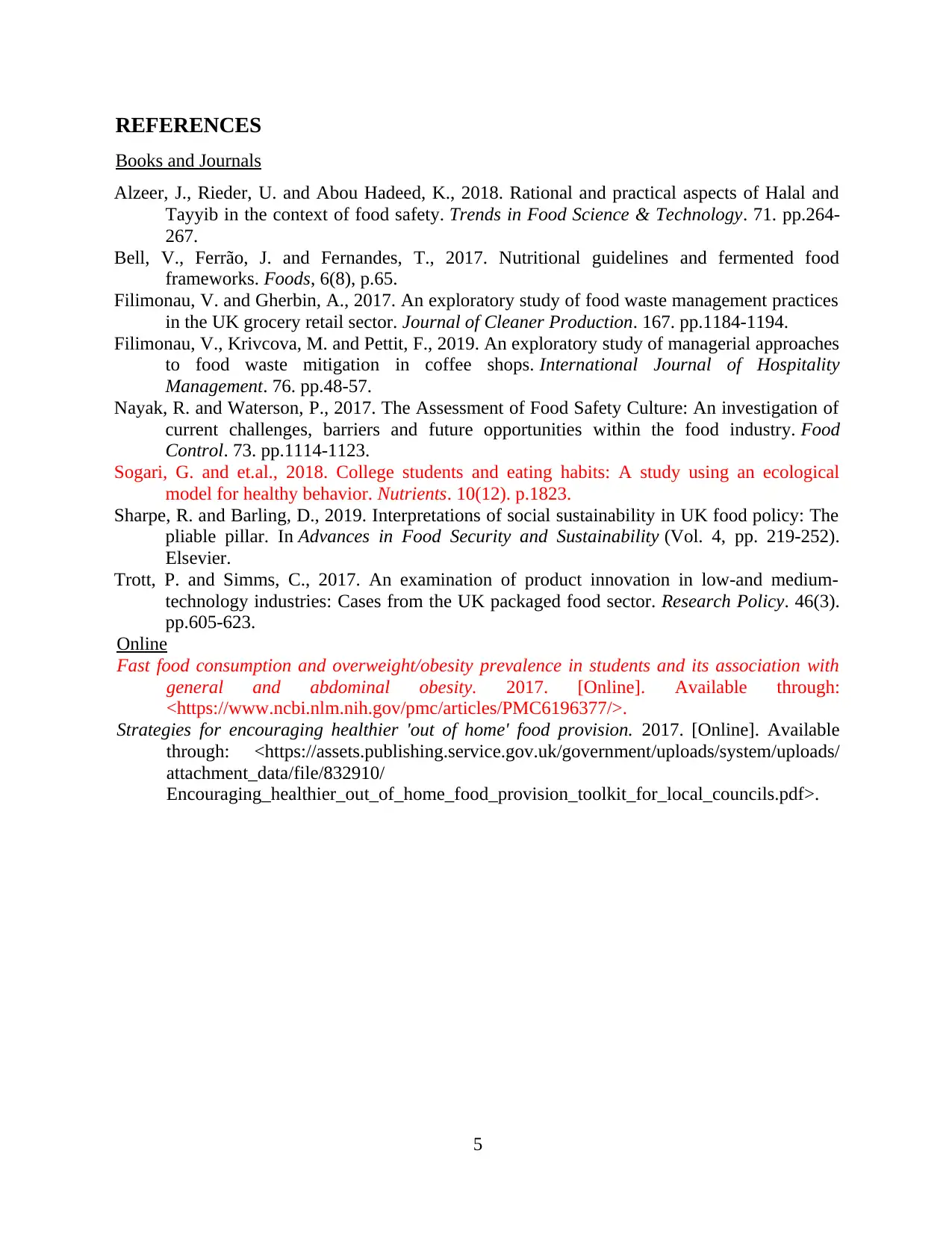
REFERENCES
Books and Journals
Alzeer, J., Rieder, U. and Abou Hadeed, K., 2018. Rational and practical aspects of Halal and
Tayyib in the context of food safety. Trends in Food Science & Technology. 71. pp.264-
267.
Bell, V., Ferrão, J. and Fernandes, T., 2017. Nutritional guidelines and fermented food
frameworks. Foods, 6(8), p.65.
Filimonau, V. and Gherbin, A., 2017. An exploratory study of food waste management practices
in the UK grocery retail sector. Journal of Cleaner Production. 167. pp.1184-1194.
Filimonau, V., Krivcova, M. and Pettit, F., 2019. An exploratory study of managerial approaches
to food waste mitigation in coffee shops. International Journal of Hospitality
Management. 76. pp.48-57.
Nayak, R. and Waterson, P., 2017. The Assessment of Food Safety Culture: An investigation of
current challenges, barriers and future opportunities within the food industry. Food
Control. 73. pp.1114-1123.
Sogari, G. and et.al., 2018. College students and eating habits: A study using an ecological
model for healthy behavior. Nutrients. 10(12). p.1823.
Sharpe, R. and Barling, D., 2019. Interpretations of social sustainability in UK food policy: The
pliable pillar. In Advances in Food Security and Sustainability (Vol. 4, pp. 219-252).
Elsevier.
Trott, P. and Simms, C., 2017. An examination of product innovation in low-and medium-
technology industries: Cases from the UK packaged food sector. Research Policy. 46(3).
pp.605-623.
Online
Fast food consumption and overweight/obesity prevalence in students and its association with
general and abdominal obesity. 2017. [Online]. Available through:
<https://www.ncbi.nlm.nih.gov/pmc/articles/PMC6196377/>.
Strategies for encouraging healthier 'out of home' food provision. 2017. [Online]. Available
through: <https://assets.publishing.service.gov.uk/government/uploads/system/uploads/
attachment_data/file/832910/
Encouraging_healthier_out_of_home_food_provision_toolkit_for_local_councils.pdf>.
5
Books and Journals
Alzeer, J., Rieder, U. and Abou Hadeed, K., 2018. Rational and practical aspects of Halal and
Tayyib in the context of food safety. Trends in Food Science & Technology. 71. pp.264-
267.
Bell, V., Ferrão, J. and Fernandes, T., 2017. Nutritional guidelines and fermented food
frameworks. Foods, 6(8), p.65.
Filimonau, V. and Gherbin, A., 2017. An exploratory study of food waste management practices
in the UK grocery retail sector. Journal of Cleaner Production. 167. pp.1184-1194.
Filimonau, V., Krivcova, M. and Pettit, F., 2019. An exploratory study of managerial approaches
to food waste mitigation in coffee shops. International Journal of Hospitality
Management. 76. pp.48-57.
Nayak, R. and Waterson, P., 2017. The Assessment of Food Safety Culture: An investigation of
current challenges, barriers and future opportunities within the food industry. Food
Control. 73. pp.1114-1123.
Sogari, G. and et.al., 2018. College students and eating habits: A study using an ecological
model for healthy behavior. Nutrients. 10(12). p.1823.
Sharpe, R. and Barling, D., 2019. Interpretations of social sustainability in UK food policy: The
pliable pillar. In Advances in Food Security and Sustainability (Vol. 4, pp. 219-252).
Elsevier.
Trott, P. and Simms, C., 2017. An examination of product innovation in low-and medium-
technology industries: Cases from the UK packaged food sector. Research Policy. 46(3).
pp.605-623.
Online
Fast food consumption and overweight/obesity prevalence in students and its association with
general and abdominal obesity. 2017. [Online]. Available through:
<https://www.ncbi.nlm.nih.gov/pmc/articles/PMC6196377/>.
Strategies for encouraging healthier 'out of home' food provision. 2017. [Online]. Available
through: <https://assets.publishing.service.gov.uk/government/uploads/system/uploads/
attachment_data/file/832910/
Encouraging_healthier_out_of_home_food_provision_toolkit_for_local_councils.pdf>.
5
⊘ This is a preview!⊘
Do you want full access?
Subscribe today to unlock all pages.

Trusted by 1+ million students worldwide
1 out of 6
Related Documents
Your All-in-One AI-Powered Toolkit for Academic Success.
+13062052269
info@desklib.com
Available 24*7 on WhatsApp / Email
![[object Object]](/_next/static/media/star-bottom.7253800d.svg)
Unlock your academic potential
Copyright © 2020–2025 A2Z Services. All Rights Reserved. Developed and managed by ZUCOL.





